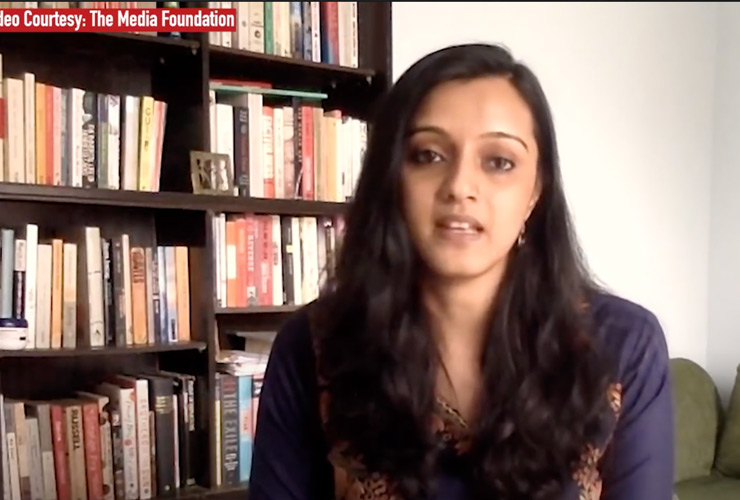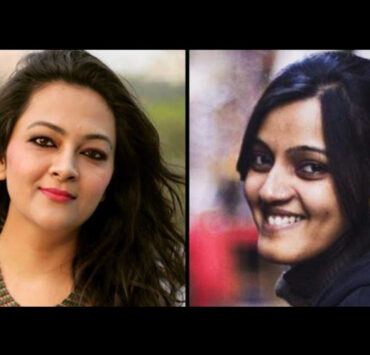
Acceptance Speech by Rohini Mohan for the Chameli Devi Jain Award for Outstanding Woman Journalist, 2019.
 Thank you so much for the Chameli Devi Jain Award for Outstanding Woman Journalist, 2019.
Thank you so much for the Chameli Devi Jain Award for Outstanding Woman Journalist, 2019.
I spent most of the last two years working on stories about the citizenship issue, how it functions and impacts people in Assam, and what it means for the rest of the country. Thank you for acknowledging this work, it’s extremely encouraging.
As an independent journalist, I wrote on the issue for eight publications over one year. I must thank all the editors and publications who demanded new angles, and stronger stories… especially Vice News. It carried my investigation into foreigners’ tribunals in Assam. The verdicts I got through RTIs showed how dangerously biased and arbitrary these tribunals are. It was an attempt to merge data journalism with a strong ground reported narrative, and I’m honoured that it is recognised today.
I am deeply honoured, but honestly, I just don’t think I have done enough. Every time a story is praised as brave, important or award-worthy, I know many of us journalists look at whether it has impacted people on the ground. Has it undone a law? Has it helped even a few people concretely?
There were massive protests across the country against the National Register of Citizens, and the Citizenship Amendment Act that openly discriminates against Muslims. But today, there are detentions, intimidation, and charges of rioting against the peaceful organisers of these protests.
Our reporting on these issues does expose how flimsy these accusations are, and throw more proof at the world, but it is also sometimes the source of a paralysing cynicism.
Sometimes it seems that journalism is done almost for its own sake. When you see unbearable injustices, like the disenfranchisement of people… or obvious undeserved hardship, like migrant workers faced after an overnight lockdown… reporting gives a sense of purpose, and writing or expression gives a sense of release. Sometimes I wonder if that’s all it’s about.
Even when a story exposes injustice, even when it is in public interest, one story rarely changes anything. And one journalist changes nothing.
The only times when journalism has been able to really shake the foundations of power are when we reported as a collective, even unconsciously. When more than the dozen usual suspects zero in on injustice and keep the pressure up from all sides, with daily reports, follow ups, video, audio, fact checks, data journalism – like many are doing now on the brutal rape in Hathras and the prevalence of upper caste violence against Dalits.
We did it for the citizenship issue, as reporters from across states and languages explored how it works, and what it will do. In Assam first, and then after the Delhi riots, I saw young reporters working as a collective – sharing costs and contacts, protecting each other, talking through their confusions. Journalists who cover the environment, for instance, do it all the time.
Working like this makes it easier to ignore all the abuses that come our way, like being called Lutyens journalists or JNU-waale, which anyway describe so few of us.
There are external forces which are already making it harder for us reporters to simply do our jobs. Media organizations don’t want to spend money on field reporting. Hundreds of my fellow journalists have lost their jobs this year in the middle of a pandemic. Many others are facing criminal cases for what they’ve said or written. And journalists working in Jammu and Kashmir find their hands tied by the state in ways that are hard for us to even imagine.
As a working field reporter, I say to people with money, intellectual curiosity and ethics – please invest in investigative projects and independent journalists. For my investigation on foreigners’ tribunals, Type Investigation provided editorial and financial support. Without it, I could not have spent the time needed on my story. They had not just funds, but also fact checkers and editors I could call at the end of a reporting day. There would also have been legal support if it came to that.
Lack of financial and legal support knocks the wind out of public interest journalism – and forces the burden of bravery and courage on already committed, but poorly funded journalists.
We need more journalists to throw ourselves at public interest stories with solidarity and healthy competition. We need to drown out the anchors and talking heads who never leave their studios. We need more reporting from the ground, from a variety of voices, not just English-language upper caste journalists like me.
And for that, we need holistic investment in Indian journalism – for powerful projects, for reporters writing in Hindi, Tamil, Marathi and other languages… and basic, decent support for those facing litigation.
Like many of my peers, I spend more time thinking about stories we haven’t done, than feeling good about the ones we have. What this award actually does, is remind me that I was part of a rare harmony of reporting on the citizenship issue – it was sensitive, humane and persistent. It also reminds me that we need so much more of that.
Thank you once again for the recognition.
Text of the speech on October 12, 2020, for the award ceremony held online during the Covid-19 pandemic. Rohini shares the award with The Wire’s Arfa Khanum Sherwani. The full video and Justice Madan Lokur’s lecture on right to protest can be viewed here:


